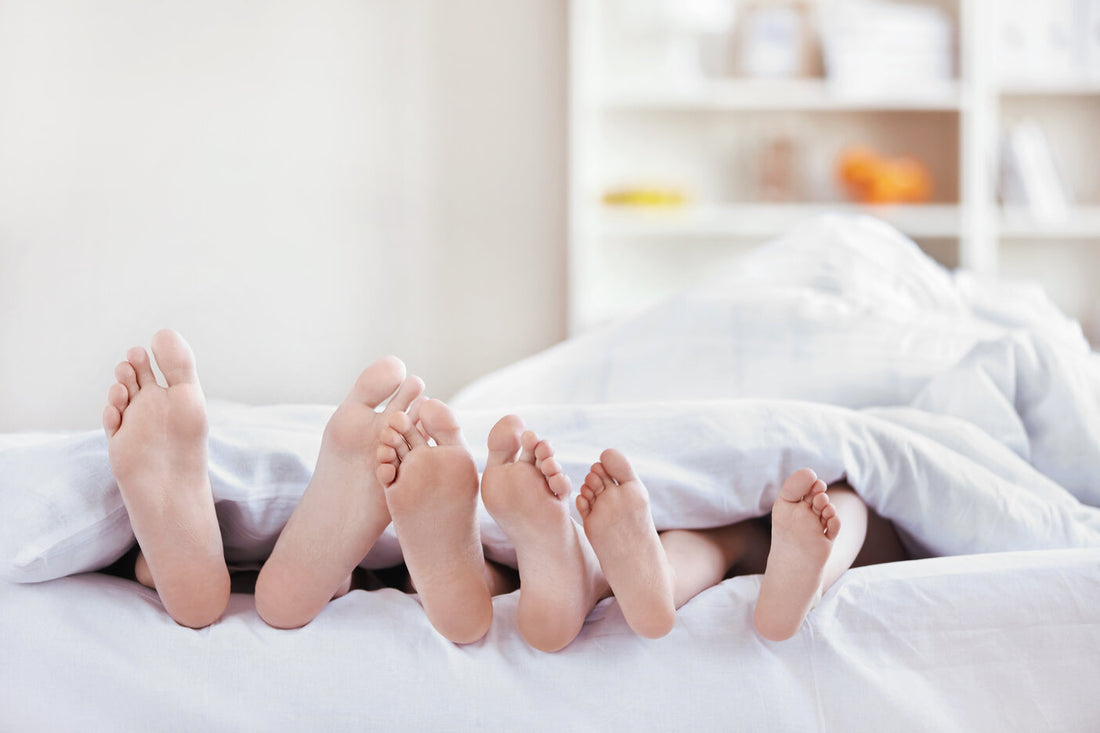What is Bedwetting (Nocturnal Enuresis)?
Bedwetting, also known as nighttime incontinence or nocturnal enuresis, is the involuntary release of urine during sleep. It’s a common occurrence in children, even after toilet training. Typically, bedwetting occurs after the age when children are expected to stay dry at night, generally between the ages of 4 and 6. While many children outgrow bedwetting on their own, it’s important to handle it with patience and understanding, as it is often just part of their natural development.
There are two types of nocturnal enuresis:
-
Primary nocturnal enuresis: This occurs when a child (or adult) has never stayed dry at night for an extended period, typically six months or longer. It is the most common form of bedwetting and is usually linked to a child’s developmental progress.
-
Secondary nocturnal enuresis: This occurs when bedwetting resumes after the child(or adult) has been consistently dry at night for at least six months. Secondary bedwetting can be caused by medical or psychological factors, such as urinary tract infections, stress, or sleep disorders.
Bedwetting before the age of 7 is generally not a cause for concern, as many children are still developing their nighttime bladder control. However, it can cause emotional stress, embarrassment, and anxiety, particularly if it continues into later childhood. Children may avoid activities like sleepovers due to fear of bedwetting, which can impact their social development.
It’s important to remember that bedwetting is not a result of poor toilet training or laziness, as, in most cases, it simply reflects the child’s development. Solutions such as lifestyle adjustments, bladder training exercises, moisture alarms, and, in some cases, medication can help manage bedwetting.
Symptoms
Of course, the primary symptom of bedwetting is waking up with wet pajamas or sheets due to urine leakage during the night. Often, children or adults may not realize they have wet the bed until they awaken to a wet sleeping environment.
While bedwetting is a physical condition, it can also have a significant emotional impact on those affected. Feelings of embarrassment and shame are common, leading individuals to attempt to hide their wet clothes or sheets from others. This emotional burden can result in avoiding social situations, such as sleepovers, to prevent the possibility of an accident around peers.
What Causes Bedwetting?
As mentioned, bedwetting can affect individuals of all ages, and its causes can differ between children and adults.
Causes of Childhood Bedwetting
The most common cause of bedwetting in children is a lack of bladder control. Typically, children learn to control their bladder between the ages of 2 to 4. It’s common for kids to experience bedwetting incidents between ages 4 to 6 as they develop and adapt to their bodily functions at their own pace. Most children gain complete control of their bladders by age 7, though accidents can still occur during their teenage years.
The following factors may contribute to frequent or recurring bedwetting in children, including:
-
Underlying Medical Conditions: Conditions such as urinary tract infections, constipation, spina bifida or nerve problems, diabetes, urinary tract blockages, obstructive sleep apnea, and ADHD.
-
Developmental Delays: Some children may simply take longer to develop the necessary physical and neurological maturity for bladder control.
-
Family History: A family history of bedwetting can increase the likelihood that a child will experience the same issue.
Causes of Adult Bedwetting
Adults (people over the age of 18) can also experience symptoms of bedwetting, even though it's less common. Potential causes for adult bedwetting include:
-
Genetics: Bedwetting often has a genetic component; if a person’s biological parents experienced bedwetting, their children are more likely to do the same.
-
Constipation: Excessive stool in the rectum can apply pressure on the bladder, interfering with nerve signals and potentially leading to bedwetting.
-
Hormonal Factors: The hormone vasopressin regulates urine production at night. Individuals who do not produce sufficient vasopressin may produce more urine at night, increasing the risk of bedwetting.
-
Small Functional Bladder Capacity: Some individuals may have a normal-sized bladder but feel the urge to urinate even when it is not full, leading to more frequent bathroom visits and a higher likelihood of bedwetting.
-
Sleep Disorders: Conditions that disrupt the ability to wake during the night can prevent individuals from responding to the signals sent by their full bladder.
- Psychological or Emotional Stress: Traumatic events or significant changes in a person's life, such as moving, changing schools, or experiencing a loss, can trigger bedwetting. Consulting with a mental health professional may help alleviate these episodes.
- Medical Conditions: Various medical issues, including sickle cell disease, neurological changes, or abnormalities in the kidneys or bladder, can also cause adult bedwetting. If someone experiences a recurrence after having been dry for an extended period, it may indicate an underlying medical problem.
Risk Factors
Bedwetting can affect individuals across all age groups, but certain factors can increase the likelihood of experiencing this condition. Understanding these risk factors can help identify those who may be more susceptible to bedwetting.
-
Gender: Bedwetting is notably more common in boys than in girls, with boys being affected twice as often.
-
Family History: A family history of bedwetting significantly raises the chances of a child experiencing the same issue. If one or both parents wet the bed as children, their child is more likely to do so as well.
-
Stress and Anxiety: Emotional stressors can trigger bedwetting episodes, particularly in children. Events such as welcoming a new sibling, starting at a new school, or spending the night away from home can contribute to increased anxiety and, subsequently, bedwetting.
-
Attention-Deficit/Hyperactivity Disorder (ADHD): Children diagnosed with ADHD are more likely to experience bedwetting. The challenges associated with this condition can affect their ability to manage bladder control during the night.
When To See a Doctor
While many children outgrow bedwetting naturally, some may require assistance, and in certain cases, it could indicate an underlying medical condition that necessitates attention. Both children and adults should consult a healthcare professional under the following specific circumstances.
For Children
It’s advisable to talk to your child’s doctor if:
- Your child still wets the bed after age 7.
- After being dry at night for several months, your child starts wetting the bed again.
- Alongside bedwetting, your child experiences pain when passing urine, frequent thirst, pink or red urine, hard stools, or snores during sleep.
For Adults
Adults experiencing bedwetting should seek medical advice if:
- They have concerns about the frequency of bedwetting incidents.
- Bedwetting occurs alongside daytime wetting.
- Sudden accidents happen after a period of being dry.
- Accidents occur after the age of 12.
When To Consult a Doctor About Bedwetting
Questions To Ask Your Doctor
When discussing bedwetting with your doctor, it's important to ask the right questions to understand the condition better and explore potential solutions. Here are some key questions to consider:
-
What is the underlying cause of my (or my child’s) bedwetting?
-
What behavioral changes can I implement to help prevent bedwetting?
-
Are there any side effects associated with the medications you might prescribe?
-
How can I support my child emotionally if they feel embarrassed about bedwetting?
-
What are the long-term implications of bedwetting?
- What tests or evaluations might be necessary to determine the cause?
- When should I expect to see improvement, and how will we track progress?
How Do I Stop Bedwetting Permanently? - Treatment Options
Fortunately, there are various approaches to manage and potentially eliminate bedwetting. Here’s a summary of the most commonly recommended treatment options for both children and adults:
1. Behavioral Changes
Implementing simple behavioral modifications can be a powerful way to manage bedwetting:
- Limit Fluid Intake: Avoid large quantities of fluids, especially caffeinated drinks, sodas, or alcohol, in the late afternoon and evening.
- Regular Bathroom Routine: Encourage frequent bathroom visits throughout the day and ensure a bathroom trip before bed. Consider setting an alarm to wake up during the night for a bathroom visit if necessary.
- Bladder Training: Teach your child or yourself to hold off urinating during the day, which can increase bladder capacity and improve nighttime control.
2. Bedwetting Alarms
Bedwetting alarms are among the most effective treatments for both children and adults. These devices detect moisture and emit a sound or vibration to wake the user before a full accident occurs. Over time, they condition the user to associate a full bladder with waking up, thus reducing bedwetting incidents. Products like the Nighthawk Bedwetting Alarm offer a discreet and noninvasive solution, promoting independence and confidence.
3. Medications
When behavioral changes alone are insufficient, medications may be prescribed:
- Desmopressin (DDAVP): This medication helps reduce nighttime urine production, making it beneficial for those who produce excess urine while sleeping.
- Anticholinergics: These can help reduce bladder contractions, assisting those with overactive bladder conditions.
Always consult a healthcare provider to discuss potential side effects and the suitability of these medications.
4. Pelvic Floor Exercises
Strengthening pelvic muscles through Kegel exercises can improve bladder control and reduce bedwetting incidents - To perform Kegel exercises:
- Identify the right muscles by stopping urination midstream.
- Contract these muscles for five seconds, then relax for five seconds. Repeat this 10-15 times per session, aiming for three sessions daily.
5. Stress Management
For some, bedwetting is linked to stress or emotional issues; thus, seeking help from a mental health professional can address these underlying factors. Cognitive-behavioral therapy (CBT) and stress-reduction techniques, such as relaxation exercises and meditation, may be beneficial in alleviating psychological triggers.
6. Incontinence Products
While working toward long-term solutions, incontinence products can provide immediate relief and security. Waterproof mattress covers, incontinence pads, and protective underwear can help manage accidents discreetly and protect bedding.
7. Professional Guidance
If home remedies and lifestyle changes are ineffective, consulting a healthcare provider is absolutely essential. They can assess for underlying medical issues, like diabetes or bladder infections, that might contribute to your or your child's bedwetting. In some cases, surgical options may be considered if other treatments have failed.


